A Critical Evaluation of Hate Crime in the United Kingdom: Analysis
VerifiedAdded on 2022/12/23
|8
|2138
|82
Report
AI Summary
This report provides a critical evaluation of hate crime in the United Kingdom. It begins with an introduction defining hate crime and highlighting its increase in the contemporary era, particularly after the Brexit referendum. The discussion section traces the origins of hate crime, its presence in the UK, and the official definition introduced in 2007. It examines the rise of hate crimes, especially after Brexit, and contrasts media coverage. The report then delves into the debates surrounding hate crime, including media perspectives, the impact on the LGBTQ community, and existing laws like the Crime and Disorder Act 1998. It presents arguments for and against harsh hate crime laws, identifies gaps in the literature, and summarizes the research methodology. The conclusion reiterates the historical context of hate crimes in the UK, the impact on minority groups, and the leniency of current laws, including the role of politicians in instigating religious hate crimes. The report is supported by a comprehensive list of references.

Running head: CRITICAL EVALUATION OF HATE CRIME IN THE UNITED KINGDOM
Paraphrase This Document
Need a fresh take? Get an instant paraphrase of this document with our AI Paraphraser
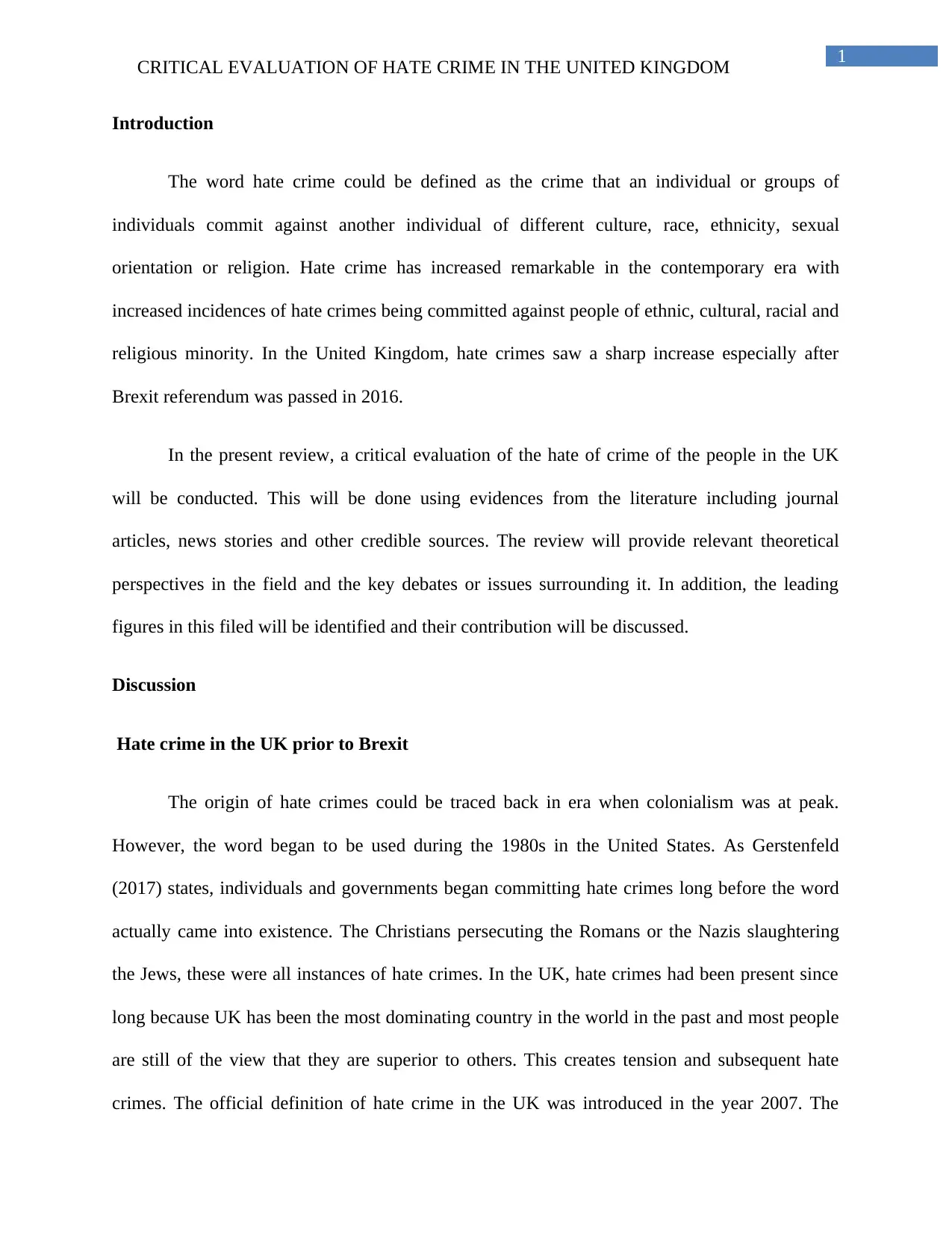
1
CRITICAL EVALUATION OF HATE CRIME IN THE UNITED KINGDOM
Introduction
The word hate crime could be defined as the crime that an individual or groups of
individuals commit against another individual of different culture, race, ethnicity, sexual
orientation or religion. Hate crime has increased remarkable in the contemporary era with
increased incidences of hate crimes being committed against people of ethnic, cultural, racial and
religious minority. In the United Kingdom, hate crimes saw a sharp increase especially after
Brexit referendum was passed in 2016.
In the present review, a critical evaluation of the hate of crime of the people in the UK
will be conducted. This will be done using evidences from the literature including journal
articles, news stories and other credible sources. The review will provide relevant theoretical
perspectives in the field and the key debates or issues surrounding it. In addition, the leading
figures in this filed will be identified and their contribution will be discussed.
Discussion
Hate crime in the UK prior to Brexit
The origin of hate crimes could be traced back in era when colonialism was at peak.
However, the word began to be used during the 1980s in the United States. As Gerstenfeld
(2017) states, individuals and governments began committing hate crimes long before the word
actually came into existence. The Christians persecuting the Romans or the Nazis slaughtering
the Jews, these were all instances of hate crimes. In the UK, hate crimes had been present since
long because UK has been the most dominating country in the world in the past and most people
are still of the view that they are superior to others. This creates tension and subsequent hate
crimes. The official definition of hate crime in the UK was introduced in the year 2007. The
CRITICAL EVALUATION OF HATE CRIME IN THE UNITED KINGDOM
Introduction
The word hate crime could be defined as the crime that an individual or groups of
individuals commit against another individual of different culture, race, ethnicity, sexual
orientation or religion. Hate crime has increased remarkable in the contemporary era with
increased incidences of hate crimes being committed against people of ethnic, cultural, racial and
religious minority. In the United Kingdom, hate crimes saw a sharp increase especially after
Brexit referendum was passed in 2016.
In the present review, a critical evaluation of the hate of crime of the people in the UK
will be conducted. This will be done using evidences from the literature including journal
articles, news stories and other credible sources. The review will provide relevant theoretical
perspectives in the field and the key debates or issues surrounding it. In addition, the leading
figures in this filed will be identified and their contribution will be discussed.
Discussion
Hate crime in the UK prior to Brexit
The origin of hate crimes could be traced back in era when colonialism was at peak.
However, the word began to be used during the 1980s in the United States. As Gerstenfeld
(2017) states, individuals and governments began committing hate crimes long before the word
actually came into existence. The Christians persecuting the Romans or the Nazis slaughtering
the Jews, these were all instances of hate crimes. In the UK, hate crimes had been present since
long because UK has been the most dominating country in the world in the past and most people
are still of the view that they are superior to others. This creates tension and subsequent hate
crimes. The official definition of hate crime in the UK was introduced in the year 2007. The
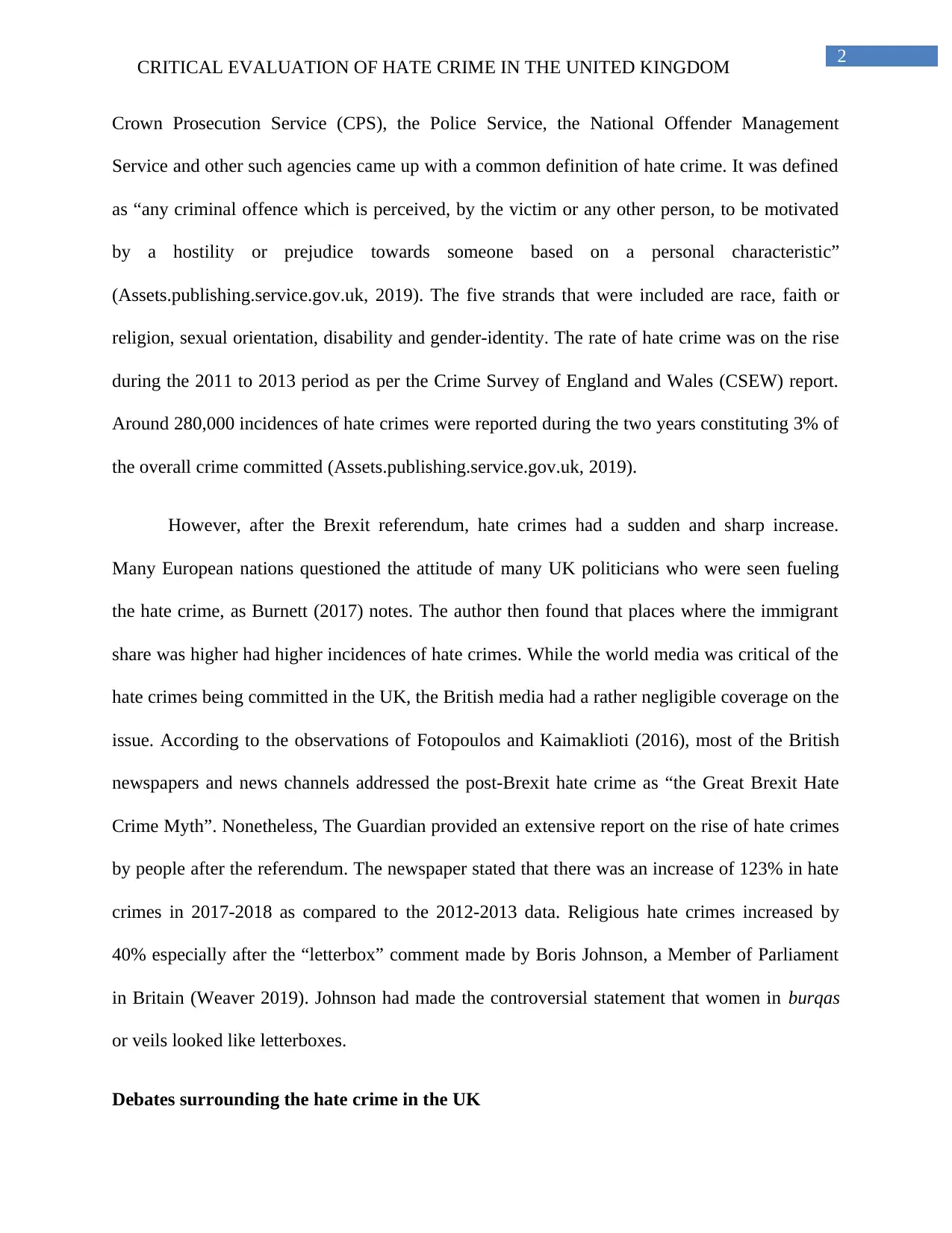
2
CRITICAL EVALUATION OF HATE CRIME IN THE UNITED KINGDOM
Crown Prosecution Service (CPS), the Police Service, the National Offender Management
Service and other such agencies came up with a common definition of hate crime. It was defined
as “any criminal offence which is perceived, by the victim or any other person, to be motivated
by a hostility or prejudice towards someone based on a personal characteristic”
(Assets.publishing.service.gov.uk, 2019). The five strands that were included are race, faith or
religion, sexual orientation, disability and gender-identity. The rate of hate crime was on the rise
during the 2011 to 2013 period as per the Crime Survey of England and Wales (CSEW) report.
Around 280,000 incidences of hate crimes were reported during the two years constituting 3% of
the overall crime committed (Assets.publishing.service.gov.uk, 2019).
However, after the Brexit referendum, hate crimes had a sudden and sharp increase.
Many European nations questioned the attitude of many UK politicians who were seen fueling
the hate crime, as Burnett (2017) notes. The author then found that places where the immigrant
share was higher had higher incidences of hate crimes. While the world media was critical of the
hate crimes being committed in the UK, the British media had a rather negligible coverage on the
issue. According to the observations of Fotopoulos and Kaimaklioti (2016), most of the British
newspapers and news channels addressed the post-Brexit hate crime as “the Great Brexit Hate
Crime Myth”. Nonetheless, The Guardian provided an extensive report on the rise of hate crimes
by people after the referendum. The newspaper stated that there was an increase of 123% in hate
crimes in 2017-2018 as compared to the 2012-2013 data. Religious hate crimes increased by
40% especially after the “letterbox” comment made by Boris Johnson, a Member of Parliament
in Britain (Weaver 2019). Johnson had made the controversial statement that women in burqas
or veils looked like letterboxes.
Debates surrounding the hate crime in the UK
CRITICAL EVALUATION OF HATE CRIME IN THE UNITED KINGDOM
Crown Prosecution Service (CPS), the Police Service, the National Offender Management
Service and other such agencies came up with a common definition of hate crime. It was defined
as “any criminal offence which is perceived, by the victim or any other person, to be motivated
by a hostility or prejudice towards someone based on a personal characteristic”
(Assets.publishing.service.gov.uk, 2019). The five strands that were included are race, faith or
religion, sexual orientation, disability and gender-identity. The rate of hate crime was on the rise
during the 2011 to 2013 period as per the Crime Survey of England and Wales (CSEW) report.
Around 280,000 incidences of hate crimes were reported during the two years constituting 3% of
the overall crime committed (Assets.publishing.service.gov.uk, 2019).
However, after the Brexit referendum, hate crimes had a sudden and sharp increase.
Many European nations questioned the attitude of many UK politicians who were seen fueling
the hate crime, as Burnett (2017) notes. The author then found that places where the immigrant
share was higher had higher incidences of hate crimes. While the world media was critical of the
hate crimes being committed in the UK, the British media had a rather negligible coverage on the
issue. According to the observations of Fotopoulos and Kaimaklioti (2016), most of the British
newspapers and news channels addressed the post-Brexit hate crime as “the Great Brexit Hate
Crime Myth”. Nonetheless, The Guardian provided an extensive report on the rise of hate crimes
by people after the referendum. The newspaper stated that there was an increase of 123% in hate
crimes in 2017-2018 as compared to the 2012-2013 data. Religious hate crimes increased by
40% especially after the “letterbox” comment made by Boris Johnson, a Member of Parliament
in Britain (Weaver 2019). Johnson had made the controversial statement that women in burqas
or veils looked like letterboxes.
Debates surrounding the hate crime in the UK
⊘ This is a preview!⊘
Do you want full access?
Subscribe today to unlock all pages.

Trusted by 1+ million students worldwide
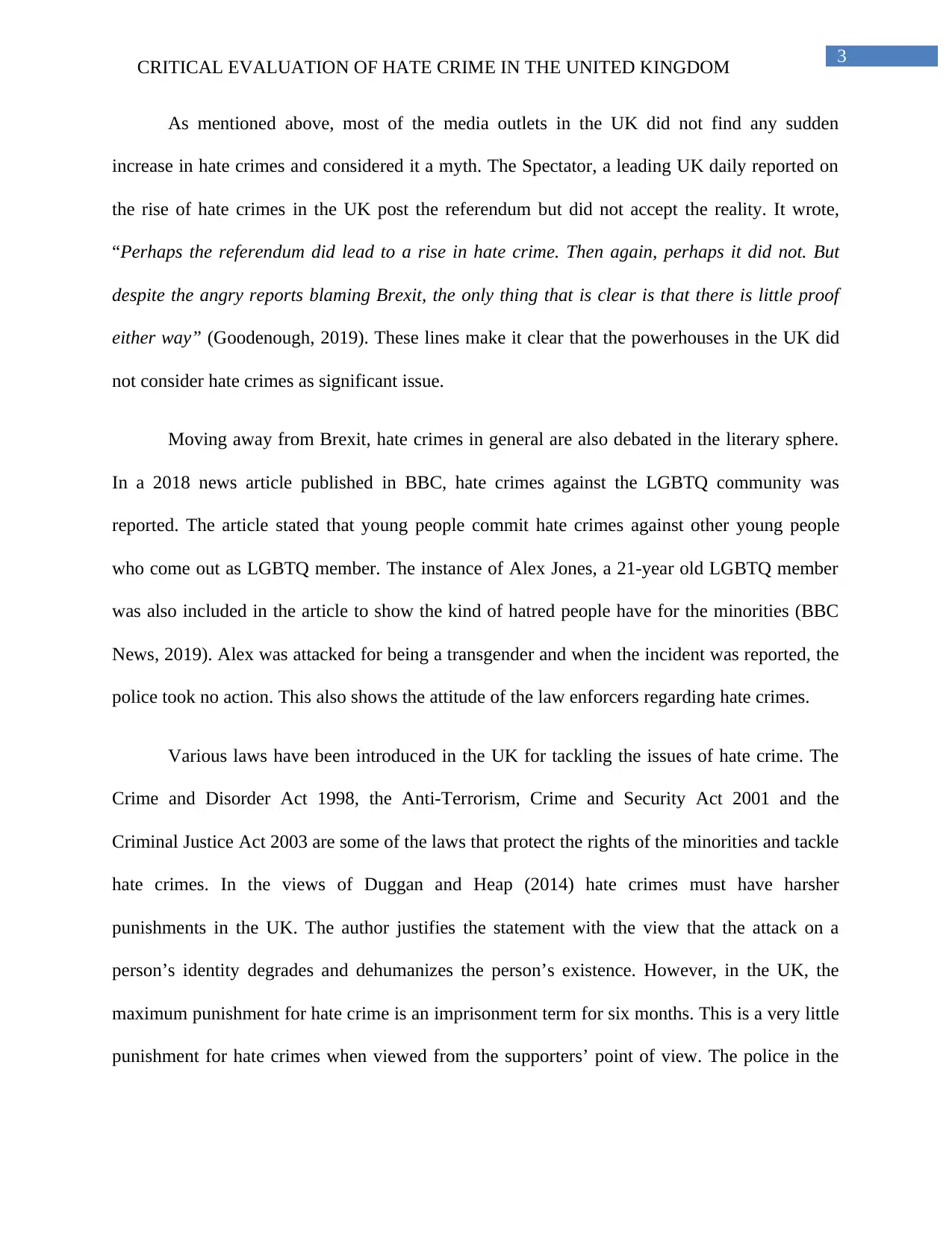
3
CRITICAL EVALUATION OF HATE CRIME IN THE UNITED KINGDOM
As mentioned above, most of the media outlets in the UK did not find any sudden
increase in hate crimes and considered it a myth. The Spectator, a leading UK daily reported on
the rise of hate crimes in the UK post the referendum but did not accept the reality. It wrote,
“Perhaps the referendum did lead to a rise in hate crime. Then again, perhaps it did not. But
despite the angry reports blaming Brexit, the only thing that is clear is that there is little proof
either way” (Goodenough, 2019). These lines make it clear that the powerhouses in the UK did
not consider hate crimes as significant issue.
Moving away from Brexit, hate crimes in general are also debated in the literary sphere.
In a 2018 news article published in BBC, hate crimes against the LGBTQ community was
reported. The article stated that young people commit hate crimes against other young people
who come out as LGBTQ member. The instance of Alex Jones, a 21-year old LGBTQ member
was also included in the article to show the kind of hatred people have for the minorities (BBC
News, 2019). Alex was attacked for being a transgender and when the incident was reported, the
police took no action. This also shows the attitude of the law enforcers regarding hate crimes.
Various laws have been introduced in the UK for tackling the issues of hate crime. The
Crime and Disorder Act 1998, the Anti-Terrorism, Crime and Security Act 2001 and the
Criminal Justice Act 2003 are some of the laws that protect the rights of the minorities and tackle
hate crimes. In the views of Duggan and Heap (2014) hate crimes must have harsher
punishments in the UK. The author justifies the statement with the view that the attack on a
person’s identity degrades and dehumanizes the person’s existence. However, in the UK, the
maximum punishment for hate crime is an imprisonment term for six months. This is a very little
punishment for hate crimes when viewed from the supporters’ point of view. The police in the
CRITICAL EVALUATION OF HATE CRIME IN THE UNITED KINGDOM
As mentioned above, most of the media outlets in the UK did not find any sudden
increase in hate crimes and considered it a myth. The Spectator, a leading UK daily reported on
the rise of hate crimes in the UK post the referendum but did not accept the reality. It wrote,
“Perhaps the referendum did lead to a rise in hate crime. Then again, perhaps it did not. But
despite the angry reports blaming Brexit, the only thing that is clear is that there is little proof
either way” (Goodenough, 2019). These lines make it clear that the powerhouses in the UK did
not consider hate crimes as significant issue.
Moving away from Brexit, hate crimes in general are also debated in the literary sphere.
In a 2018 news article published in BBC, hate crimes against the LGBTQ community was
reported. The article stated that young people commit hate crimes against other young people
who come out as LGBTQ member. The instance of Alex Jones, a 21-year old LGBTQ member
was also included in the article to show the kind of hatred people have for the minorities (BBC
News, 2019). Alex was attacked for being a transgender and when the incident was reported, the
police took no action. This also shows the attitude of the law enforcers regarding hate crimes.
Various laws have been introduced in the UK for tackling the issues of hate crime. The
Crime and Disorder Act 1998, the Anti-Terrorism, Crime and Security Act 2001 and the
Criminal Justice Act 2003 are some of the laws that protect the rights of the minorities and tackle
hate crimes. In the views of Duggan and Heap (2014) hate crimes must have harsher
punishments in the UK. The author justifies the statement with the view that the attack on a
person’s identity degrades and dehumanizes the person’s existence. However, in the UK, the
maximum punishment for hate crime is an imprisonment term for six months. This is a very little
punishment for hate crimes when viewed from the supporters’ point of view. The police in the
Paraphrase This Document
Need a fresh take? Get an instant paraphrase of this document with our AI Paraphraser
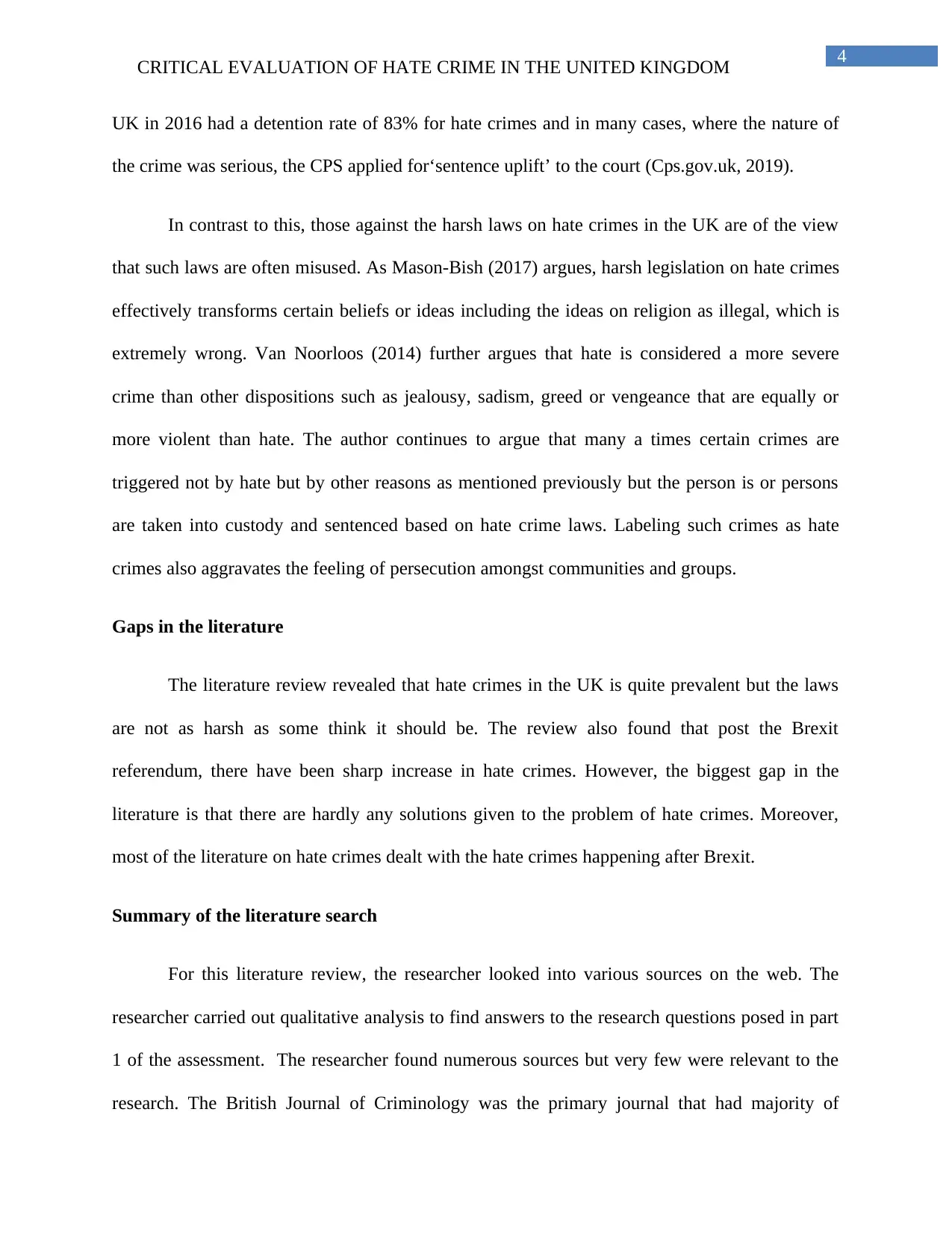
4
CRITICAL EVALUATION OF HATE CRIME IN THE UNITED KINGDOM
UK in 2016 had a detention rate of 83% for hate crimes and in many cases, where the nature of
the crime was serious, the CPS applied for‘sentence uplift’ to the court (Cps.gov.uk, 2019).
In contrast to this, those against the harsh laws on hate crimes in the UK are of the view
that such laws are often misused. As Mason-Bish (2017) argues, harsh legislation on hate crimes
effectively transforms certain beliefs or ideas including the ideas on religion as illegal, which is
extremely wrong. Van Noorloos (2014) further argues that hate is considered a more severe
crime than other dispositions such as jealousy, sadism, greed or vengeance that are equally or
more violent than hate. The author continues to argue that many a times certain crimes are
triggered not by hate but by other reasons as mentioned previously but the person is or persons
are taken into custody and sentenced based on hate crime laws. Labeling such crimes as hate
crimes also aggravates the feeling of persecution amongst communities and groups.
Gaps in the literature
The literature review revealed that hate crimes in the UK is quite prevalent but the laws
are not as harsh as some think it should be. The review also found that post the Brexit
referendum, there have been sharp increase in hate crimes. However, the biggest gap in the
literature is that there are hardly any solutions given to the problem of hate crimes. Moreover,
most of the literature on hate crimes dealt with the hate crimes happening after Brexit.
Summary of the literature search
For this literature review, the researcher looked into various sources on the web. The
researcher carried out qualitative analysis to find answers to the research questions posed in part
1 of the assessment. The researcher found numerous sources but very few were relevant to the
research. The British Journal of Criminology was the primary journal that had majority of
CRITICAL EVALUATION OF HATE CRIME IN THE UNITED KINGDOM
UK in 2016 had a detention rate of 83% for hate crimes and in many cases, where the nature of
the crime was serious, the CPS applied for‘sentence uplift’ to the court (Cps.gov.uk, 2019).
In contrast to this, those against the harsh laws on hate crimes in the UK are of the view
that such laws are often misused. As Mason-Bish (2017) argues, harsh legislation on hate crimes
effectively transforms certain beliefs or ideas including the ideas on religion as illegal, which is
extremely wrong. Van Noorloos (2014) further argues that hate is considered a more severe
crime than other dispositions such as jealousy, sadism, greed or vengeance that are equally or
more violent than hate. The author continues to argue that many a times certain crimes are
triggered not by hate but by other reasons as mentioned previously but the person is or persons
are taken into custody and sentenced based on hate crime laws. Labeling such crimes as hate
crimes also aggravates the feeling of persecution amongst communities and groups.
Gaps in the literature
The literature review revealed that hate crimes in the UK is quite prevalent but the laws
are not as harsh as some think it should be. The review also found that post the Brexit
referendum, there have been sharp increase in hate crimes. However, the biggest gap in the
literature is that there are hardly any solutions given to the problem of hate crimes. Moreover,
most of the literature on hate crimes dealt with the hate crimes happening after Brexit.
Summary of the literature search
For this literature review, the researcher looked into various sources on the web. The
researcher carried out qualitative analysis to find answers to the research questions posed in part
1 of the assessment. The researcher found numerous sources but very few were relevant to the
research. The British Journal of Criminology was the primary journal that had majority of
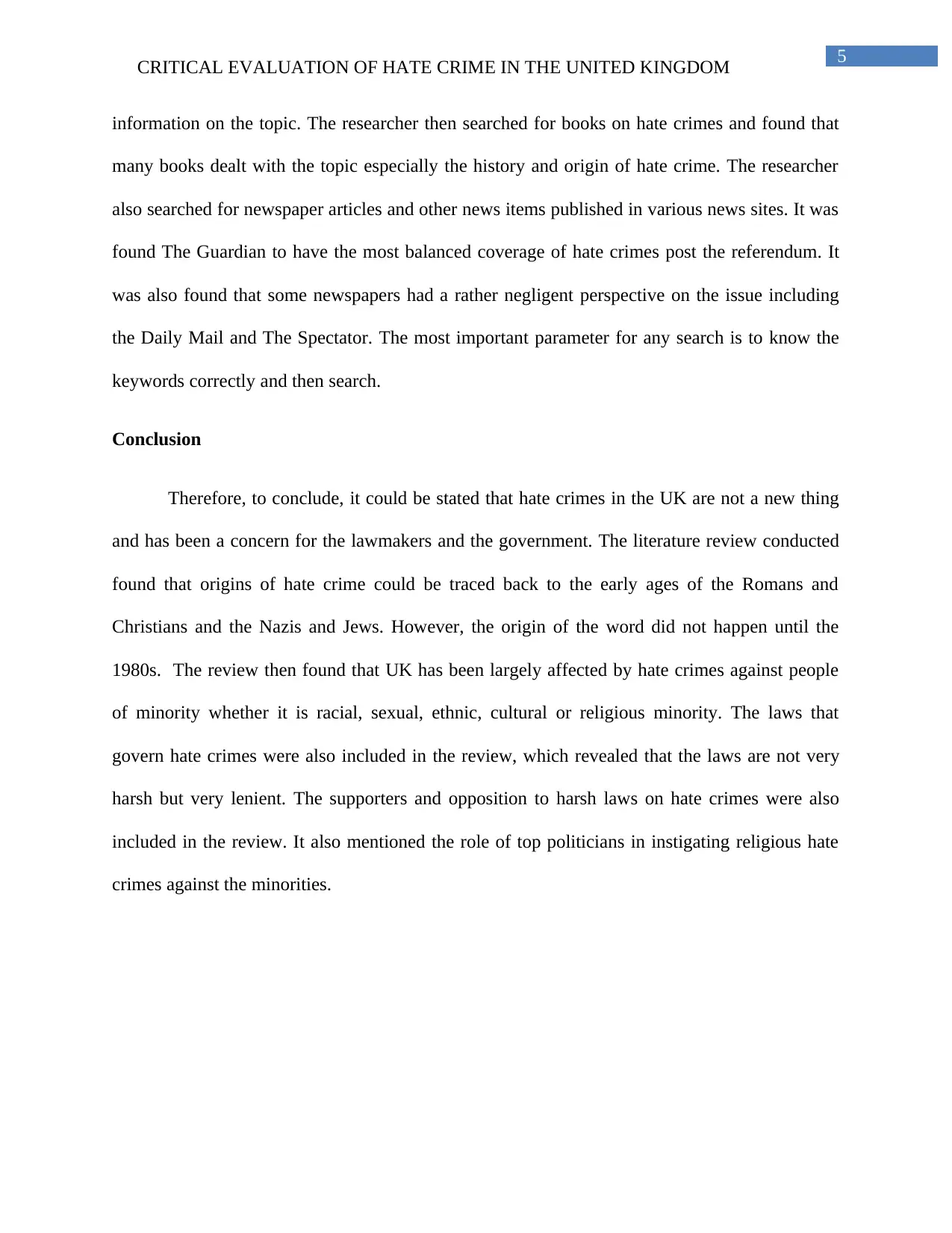
5
CRITICAL EVALUATION OF HATE CRIME IN THE UNITED KINGDOM
information on the topic. The researcher then searched for books on hate crimes and found that
many books dealt with the topic especially the history and origin of hate crime. The researcher
also searched for newspaper articles and other news items published in various news sites. It was
found The Guardian to have the most balanced coverage of hate crimes post the referendum. It
was also found that some newspapers had a rather negligent perspective on the issue including
the Daily Mail and The Spectator. The most important parameter for any search is to know the
keywords correctly and then search.
Conclusion
Therefore, to conclude, it could be stated that hate crimes in the UK are not a new thing
and has been a concern for the lawmakers and the government. The literature review conducted
found that origins of hate crime could be traced back to the early ages of the Romans and
Christians and the Nazis and Jews. However, the origin of the word did not happen until the
1980s. The review then found that UK has been largely affected by hate crimes against people
of minority whether it is racial, sexual, ethnic, cultural or religious minority. The laws that
govern hate crimes were also included in the review, which revealed that the laws are not very
harsh but very lenient. The supporters and opposition to harsh laws on hate crimes were also
included in the review. It also mentioned the role of top politicians in instigating religious hate
crimes against the minorities.
CRITICAL EVALUATION OF HATE CRIME IN THE UNITED KINGDOM
information on the topic. The researcher then searched for books on hate crimes and found that
many books dealt with the topic especially the history and origin of hate crime. The researcher
also searched for newspaper articles and other news items published in various news sites. It was
found The Guardian to have the most balanced coverage of hate crimes post the referendum. It
was also found that some newspapers had a rather negligent perspective on the issue including
the Daily Mail and The Spectator. The most important parameter for any search is to know the
keywords correctly and then search.
Conclusion
Therefore, to conclude, it could be stated that hate crimes in the UK are not a new thing
and has been a concern for the lawmakers and the government. The literature review conducted
found that origins of hate crime could be traced back to the early ages of the Romans and
Christians and the Nazis and Jews. However, the origin of the word did not happen until the
1980s. The review then found that UK has been largely affected by hate crimes against people
of minority whether it is racial, sexual, ethnic, cultural or religious minority. The laws that
govern hate crimes were also included in the review, which revealed that the laws are not very
harsh but very lenient. The supporters and opposition to harsh laws on hate crimes were also
included in the review. It also mentioned the role of top politicians in instigating religious hate
crimes against the minorities.
⊘ This is a preview!⊘
Do you want full access?
Subscribe today to unlock all pages.

Trusted by 1+ million students worldwide
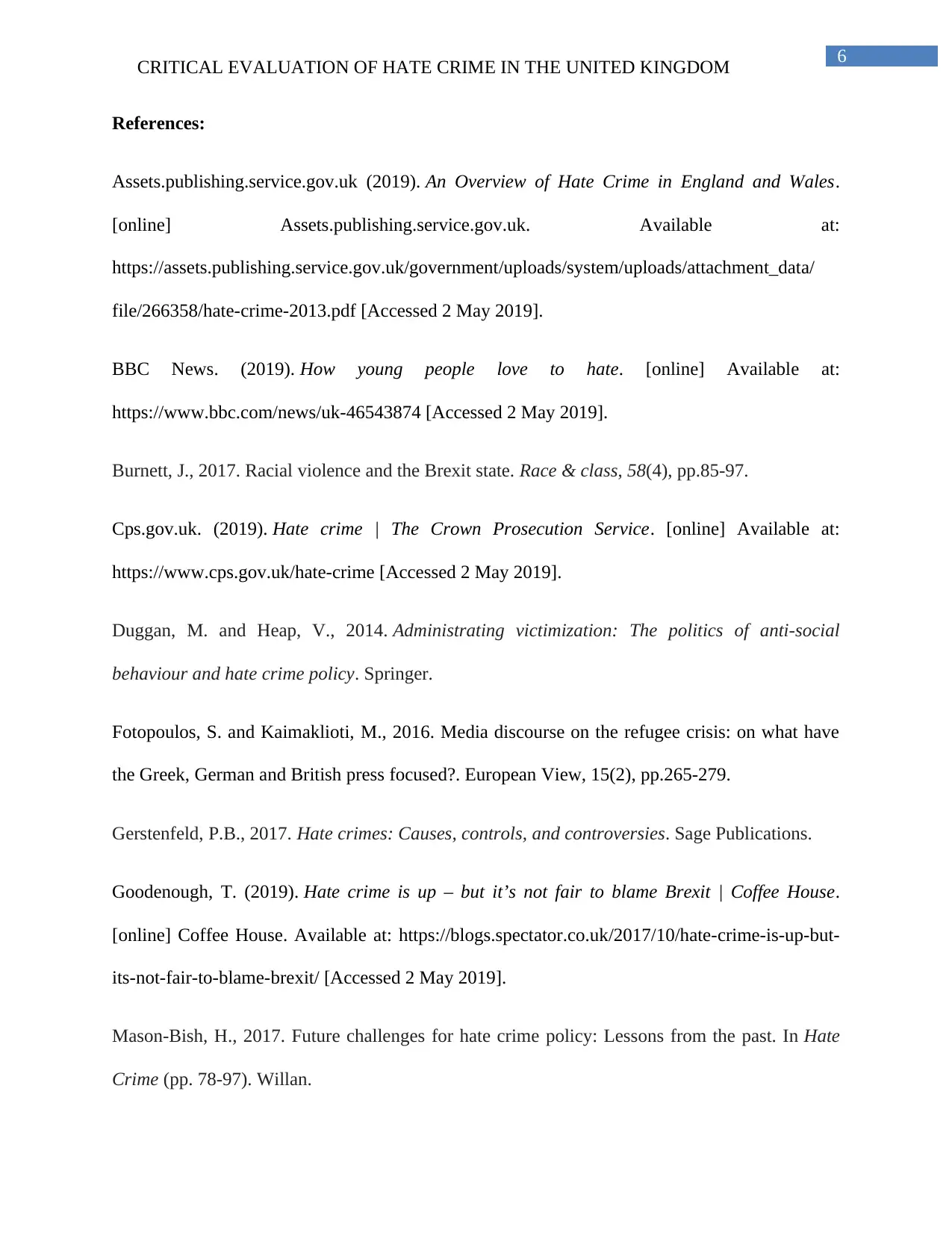
6
CRITICAL EVALUATION OF HATE CRIME IN THE UNITED KINGDOM
References:
Assets.publishing.service.gov.uk (2019). An Overview of Hate Crime in England and Wales.
[online] Assets.publishing.service.gov.uk. Available at:
https://assets.publishing.service.gov.uk/government/uploads/system/uploads/attachment_data/
file/266358/hate-crime-2013.pdf [Accessed 2 May 2019].
BBC News. (2019). How young people love to hate. [online] Available at:
https://www.bbc.com/news/uk-46543874 [Accessed 2 May 2019].
Burnett, J., 2017. Racial violence and the Brexit state. Race & class, 58(4), pp.85-97.
Cps.gov.uk. (2019). Hate crime | The Crown Prosecution Service. [online] Available at:
https://www.cps.gov.uk/hate-crime [Accessed 2 May 2019].
Duggan, M. and Heap, V., 2014. Administrating victimization: The politics of anti-social
behaviour and hate crime policy. Springer.
Fotopoulos, S. and Kaimaklioti, M., 2016. Media discourse on the refugee crisis: on what have
the Greek, German and British press focused?. European View, 15(2), pp.265-279.
Gerstenfeld, P.B., 2017. Hate crimes: Causes, controls, and controversies. Sage Publications.
Goodenough, T. (2019). Hate crime is up – but it’s not fair to blame Brexit | Coffee House.
[online] Coffee House. Available at: https://blogs.spectator.co.uk/2017/10/hate-crime-is-up-but-
its-not-fair-to-blame-brexit/ [Accessed 2 May 2019].
Mason-Bish, H., 2017. Future challenges for hate crime policy: Lessons from the past. In Hate
Crime (pp. 78-97). Willan.
CRITICAL EVALUATION OF HATE CRIME IN THE UNITED KINGDOM
References:
Assets.publishing.service.gov.uk (2019). An Overview of Hate Crime in England and Wales.
[online] Assets.publishing.service.gov.uk. Available at:
https://assets.publishing.service.gov.uk/government/uploads/system/uploads/attachment_data/
file/266358/hate-crime-2013.pdf [Accessed 2 May 2019].
BBC News. (2019). How young people love to hate. [online] Available at:
https://www.bbc.com/news/uk-46543874 [Accessed 2 May 2019].
Burnett, J., 2017. Racial violence and the Brexit state. Race & class, 58(4), pp.85-97.
Cps.gov.uk. (2019). Hate crime | The Crown Prosecution Service. [online] Available at:
https://www.cps.gov.uk/hate-crime [Accessed 2 May 2019].
Duggan, M. and Heap, V., 2014. Administrating victimization: The politics of anti-social
behaviour and hate crime policy. Springer.
Fotopoulos, S. and Kaimaklioti, M., 2016. Media discourse on the refugee crisis: on what have
the Greek, German and British press focused?. European View, 15(2), pp.265-279.
Gerstenfeld, P.B., 2017. Hate crimes: Causes, controls, and controversies. Sage Publications.
Goodenough, T. (2019). Hate crime is up – but it’s not fair to blame Brexit | Coffee House.
[online] Coffee House. Available at: https://blogs.spectator.co.uk/2017/10/hate-crime-is-up-but-
its-not-fair-to-blame-brexit/ [Accessed 2 May 2019].
Mason-Bish, H., 2017. Future challenges for hate crime policy: Lessons from the past. In Hate
Crime (pp. 78-97). Willan.
Paraphrase This Document
Need a fresh take? Get an instant paraphrase of this document with our AI Paraphraser
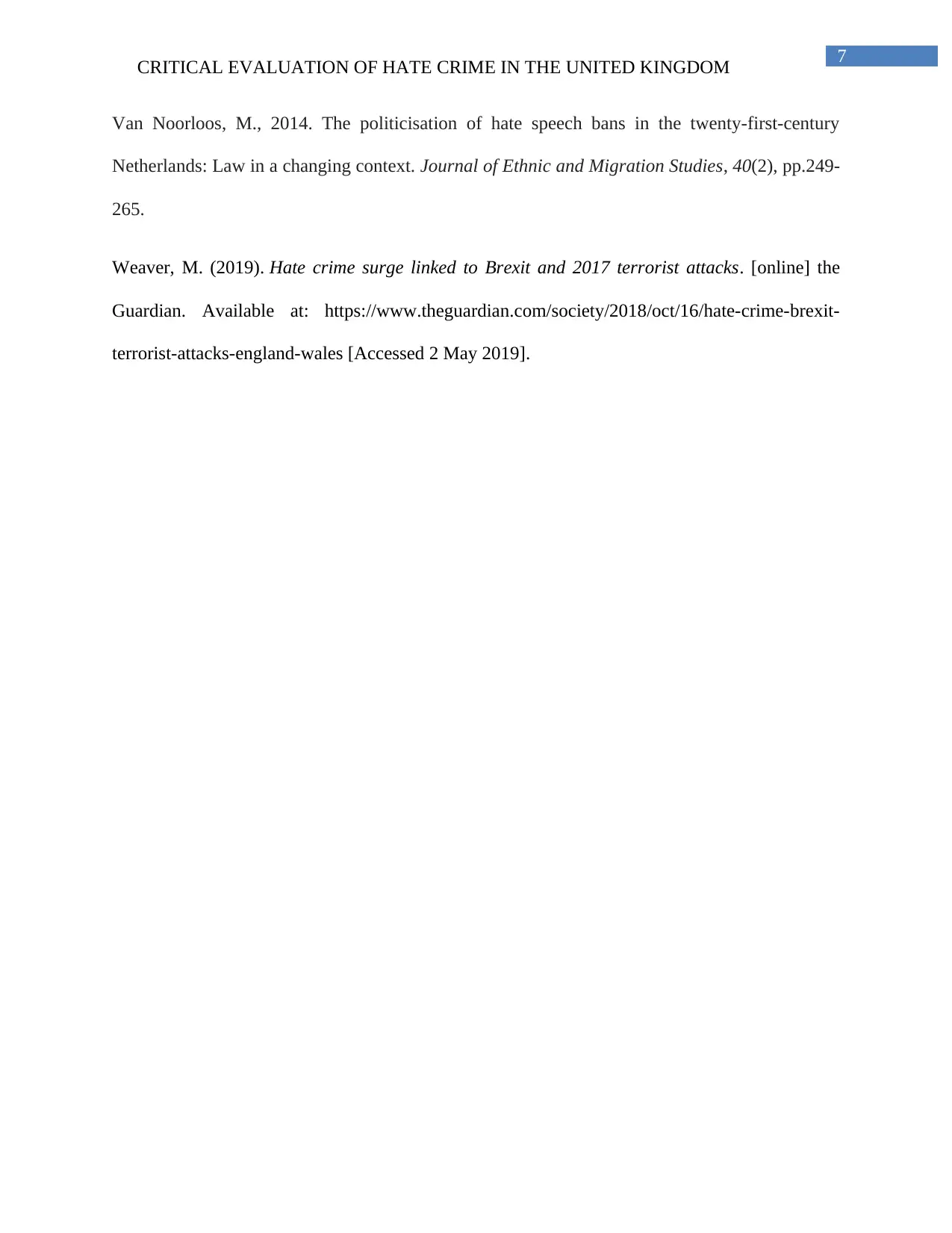
7
CRITICAL EVALUATION OF HATE CRIME IN THE UNITED KINGDOM
Van Noorloos, M., 2014. The politicisation of hate speech bans in the twenty-first-century
Netherlands: Law in a changing context. Journal of Ethnic and Migration Studies, 40(2), pp.249-
265.
Weaver, M. (2019). Hate crime surge linked to Brexit and 2017 terrorist attacks. [online] the
Guardian. Available at: https://www.theguardian.com/society/2018/oct/16/hate-crime-brexit-
terrorist-attacks-england-wales [Accessed 2 May 2019].
CRITICAL EVALUATION OF HATE CRIME IN THE UNITED KINGDOM
Van Noorloos, M., 2014. The politicisation of hate speech bans in the twenty-first-century
Netherlands: Law in a changing context. Journal of Ethnic and Migration Studies, 40(2), pp.249-
265.
Weaver, M. (2019). Hate crime surge linked to Brexit and 2017 terrorist attacks. [online] the
Guardian. Available at: https://www.theguardian.com/society/2018/oct/16/hate-crime-brexit-
terrorist-attacks-england-wales [Accessed 2 May 2019].
1 out of 8
Your All-in-One AI-Powered Toolkit for Academic Success.
+13062052269
info@desklib.com
Available 24*7 on WhatsApp / Email
![[object Object]](/_next/static/media/star-bottom.7253800d.svg)
Unlock your academic potential
Copyright © 2020–2026 A2Z Services. All Rights Reserved. Developed and managed by ZUCOL.
